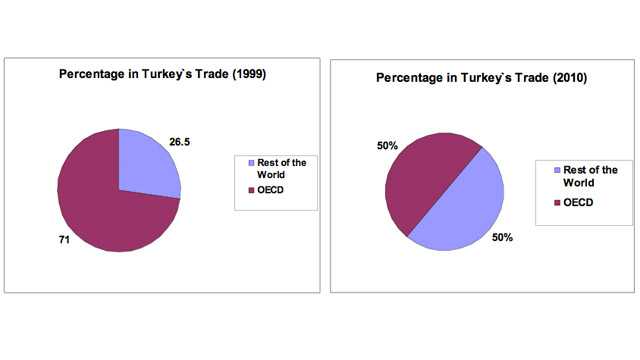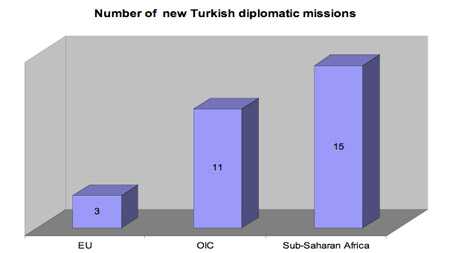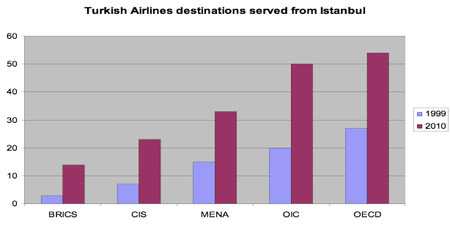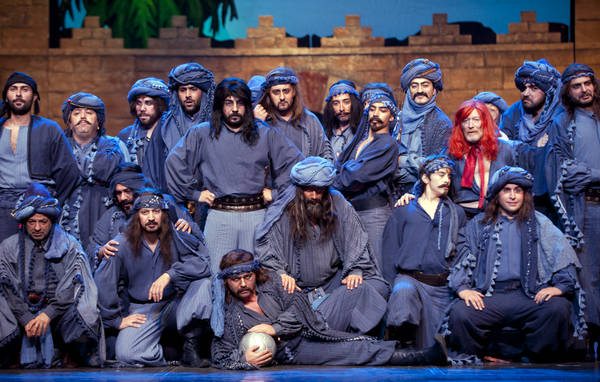The complex dynamics of Turkey’s geographical position and cultural uniqueness have always defied easy explanation. But in the decade since Tayip Erdogan and his Justice and Development Party (AKP) were first elected, change within Turkey and between Turkey and the world has erupted in a number of different directions. Consequently, the word “enigmatic” is perhaps the best way to describe Turkey’s foreign policy over the past ten years.
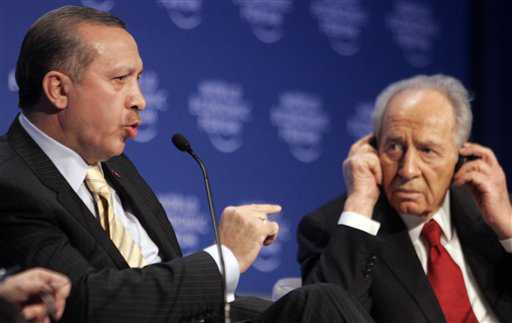
By Dr. Anthony Rusonik
Turkish society has shown conflicting signs of drift towards East and West under Ergodan’s rule. On one hand, we witness continued restrictions on press freedoms, trumped-up charges against rivals in the secular defense establishment, and a slow but deliberate injection of political Islam into the primary educational system. On the other, there is the 2010 Constitutional package that elevated an independent judiciary, encouraged freedom of association, and was designed to promote Turkey’s EU bid, albeit without success. One day Erdogan makes a personal apology to the Kurds for historic wrongs, the next day the Turkish army increases operations against the PKK in Northern Iraq, and Erdogan bristles at French and American recognition of the Armenian genocide.
Given these apparent contradictions, two common themes emerge in a survey of the literature that attempts to explain Turkish behaviour, as evidenced in a December 2010 episode of TV Ontario’s “The Agenda”. One school, led by scholars such as Daniel Pipes, considers that Turkey has gone “rogue”, shifted to Iran and is now bent on the destruction of the secular republic founded in 1923 by Kamal Ataturk. Pipes argues that Turkey can no longer be trusted by NATO and should be expelled from the alliance. The other school of thought represented by Janice Stein of U of T, maintains that Turkey’s “swings” are natural and manageable bumps on the road of a journey towards modernization, democratization, and constitutionalism. New forces unleashed vie for influence in a spirited pluralism.
A third school of thought – less credible in traditional Realist frameworks of analysis but nonetheless evident in observation of Erdogan and the pendulum that is now Turkish foreign policy – is that Turkey is more and more Mr. Erdogan’s country. Its fluctuations reflect the Prime Minister’s ego and mercurial temperament more than is allowed in “serious” analytical frameworks. In particular, Erdogan’s neo-Ottoman ambitions are merged with personal character traits where pride and honour sometimes overcome traditional state interests. In short, Mr. Erdogan bristles when he feels slighted, basks in the glory of praise, and this seems to affect his policy decisions.
Since neither Stein nor Pipes’ approaches can explain past behavior nor predict current outcomes with confidence, a framework based on leadership psychology deserves closer examination.
The Economist first offered this explanation in its assessment of Turkish-Syrian relations. Puzzled as to why Ankara demonstrated such patience for Bashar Assad’s crackdown and the resultant destabilization of Turkey’s southern border, The Economist concluded that the irreparable break between Erdogan and Assad didn’t occur until the former had the belated revelation that the latter chose not to heed his advice. It wasn’t Assad’s repression per se that produced a fit of pique in Erdogan and his barb that “Assad would end up like Qaddafi.” No, it was Assad’s apparent refusal to heed Erdogan’s personal advice to reform that led to Erdogan’s contempt for his former friend. Still, most in Syrian opposition see more bluster than action in Erdogan. Apart from support for Syrian refugees, Turkey has not acted against the Assad regime. Erdogan’s “zero problems” policy is in tatters and the moment for Turkey to assume leadership of the Arab Spring seems lost.
The same kind of personal reaction is evident in Turkey’s drift towards Iran after Ankara’s political liberalization and economic reforms failed to impress Germany and France. Former French President Sarkozy dismissed Turkey’s EU bid in no uncertain terms with “I do not think that Turkey has a place in Europe.” In a bid to spite the Europeans, Erdogan turned East despite Tehran’s support for Assad, despite competition with Iran for influence in the Arab world, and despite discomfort with Iran’s nuclear ambitions. Unless and until, Erdogan declared, Western sanctions against Iran win UN endorsement and Israel’s nuclear program is also investigated, Turkey will continue to import Iranian oil. It appears a snubbed Erdogan has overplayed his hand, such that the Iranians tested his patience and forced him to prevent Iranian aircraft loaded with arms for Assad to overfly Turkish territory. It seems that Erdogan might have traded his last chance at EU membership for an alliance with Iran that may risk key Turkish interests.
The role of insult or perceived insult also deserves full investigation in the demise of Turkish-Israeli relations. Here, neither Pipes nor Stein can explain the Ankara-Jerusalem whirlwind without some of the puzzle pieces force-fit to their theories. Pipes maintains Erdogan’s break with Israel was an orchestrated and calculated policy that needed a pretext –The 2009 Gaza Flotilla– to launch a neo-Ottoman bid for Turkish resurgence in the Arab World. Pipes casts Erdogan in the provocative and reckless tradition of Gamal Nasser and Saddam Hussein, where the aspiring Muslim leader taunts Israel to win the Arab street, grows bolder with apparent success, then pays the price. If there is some truth to this assertion, it is still at odds with the image of Erdogan calling Israeli Prime Minister Netanyahu with an offer –insistence—to send Turkish water bombers to help the Israelis fight forest fires, or the acceptance of Israeli humanitarian aid for Turkish earthquake victims.
On the other hand, Stein’s view of the tattered relationship as a natural re-balancing after a decade of close defense ties that have elevated Turkey’s military too high in domestic politics and rendered Turkey’s prestige too low in the Arab world doesn’t quite capture the dynamic of demise either. It fails to explain why Erdogan cannot muster more than rhetoric against Assad now because he cannot – or will not – reach out to Jerusalem to ensure its intentions and support – quiet or otherwise – should Turkey act against Damascus. His rhetorical threats to send another Flotilla with Turkish naval escort, or to challenge Israel and Cyprus over their massive natural gas finds in the Mediterranean, seem muted and frustrated. A diplomatic channel with Jerusalem, Erdogan must know, would allow him to negotiate Turkey’s economic claims to the undersea riches.
If Erdogan’s break with Israel is only partly explained by his half-hearted Nasserite ambitions and as a measure to curb Turkey’s military, then the lion’s share of the answer is indeed the fact that Erdogan considers that Israel is too proud, too stubborn, and has slighted Tayip Erdogan once too often.
Well before the Flotilla incident and Erdogan’s steadfast determination to extract an apology from Israel as a condition to restore a degree of warmth to the relationship, Erdogan perceived a series of insults from Israel.
The first fissures in the relationship formed in January 2009 at Davos, where Erdogan assailed Israeli President Shimon Peres over the Gaza War. The tone of Erdogan’s attack at first appears to support Pipes’ position that Turkey calculated the break and used the Gaza war to launch a neo-Ottoman drive. The undercurrents, however, are of greater interest. First, the “last straw” from Erdogan in the debate wasn’t Peres per se, but the fact that the moderators allowed him less time to speak than Peres had. That’s what enraged Erdogan. Second, although he could not say it at the time, Erdogan was furious that the Gaza operation was planned and occurred while he had invested his personal energies and reputation in secret Israeli-Syrian negotiations The fact that had such diplomacy succeeded Erdogan would look a fool in hindsight now as Assad’s crackdown is unabated is both ironic and irrelevant. What counts is that Erdogan felt burned, and he never forgot it.
The sense of humiliation reached a new level a year later as the Israel summoned the Turkish ambassador over an anti-Israeli television broadcast in Turkey. To emphasize their displeasure, the Israelis declined to shake hands or display the Turkish flag, and they arranged to seat the Turkish ambassador in a lower position.
Erdogan bristled. Ankara called for Israel “to abide by diplomatic courtesy and respect.” The statement was less critical of the Israeli policy per se than in the way Turkey perceived Israel handled the differences.
In hindsight, then, it seems little wonder Erdogan attempted to restore Turkish pride and protest Israeli policy with his refusal of Israeli requests to curb the Gaza Flotilla in 2010. Erdogan maintained that the Flotilla was a popular expression of support for the Palestinians, and that the state would not interfere with that. In yet another irony, and regardless of where one casts blame in the incident, Erdogan’s immediate demand beyond an end to the blockade was for an apology and compensation – from the state of Israel to the Turkish state. This was no longer a private matter for Erdogan, but a national interest and a personal mission.
Lost in the aftermath of the incident was the fact that Turkey was a quiet advocate for the release of GIlad Shalit and secret Hamas-Israel talks, such that Turkey’ prestige as a power-broker was restored. The fact that the Israelis remained distrustful and preferred the now-deposed Mubarak regime in Egypt to mediate is immaterial.
No, the relationship did not hit rock bottom until the UN Palmer report concluded that Israel’s blockade was legal and, further, that Israeli commandos had a right to defend themselves when they encountered resistance on the Ravi Mamara. Stunned and enraged that he was contradicted by the UN, Erdogan denounced the report that he had insisted upon and awaited with uncharacteristic patience. Defiant, Erdogan reiterated his insistence on an Israeli apology and cancelled all residual military deals with Israel.
Israel has offered regret and humanitarian compensation, but refuses a formal diplomatic apology for legal reasons. The standoff continues, at considerable cost to both Ankara and Jerusalem. Israel is again excluded from NATO exercises at Erdogan’s insistence. Erdogan’s pride may be intact as a result, but his Syrian and Cypriot headaches would ease if he could swallow a bitter bill. Israel has made it national policy not to engage in a rhetorical war with Turkey or to prod at Erdogan’s wounds, but the American recognition of Armenian genocide- even as Israel withheld its own recognition- is a reminder that Jerusalem‘s isolation does not render it without means.
Warranted or not, and irrespective of one’s own biases, one must conclude that an Israeli apology could have far more impact on relations with Turkey than conventional analysis considers possible.
Turkey under Erdogan is neither a rogue in Eastern drift towards Iran nor a model for Westernized democratic Islam. Rather. Turkey under Erdogan is, well, Turkey under Erdogan.
Dr. Anthony Rusonik is a contributor to Geopoliticalmonitor.com.


